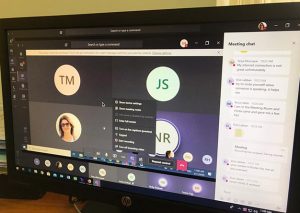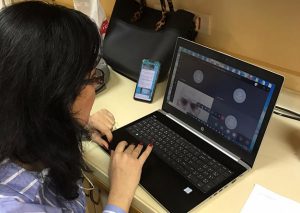Blog Article: Online Learning and Advice During The Coronavirus Period
Tuesday, 24 March 2020
Share this article:
BY SAGE BALL, VICE PRINCIPAL PASTORAL
We as a school community, as well as a local and global community, are going through unprecedented times. Yet we shall prevail, and when we do all members in the Brummana High School community will be in a strong position to continue with their studies, work and lives in order to achieve the success, healthiness and ultimately happiness they wish for.
The following blog article has been created to provide all stakeholders in the BHS community – students, parents, staff and even old scholars – as well as anyone interested outside of the community, with advice they may well require during this Coronavirus period. What you will find is more of an understanding of what is currently being achieved, as well as what is planned, in terms of online learning at the school. Also included is advice for parents (and students) in order to stay successful, healthy and happy even during these times. Some of the advice and tips have been taken from the UK Government’s Division of Educational and Child Psychology (DECP) and the British Psychological Society (BPS).


ONLINE (OR VIRTUAL OR DISTANCE) LEARNING
UPPER SCHOOL
For our older students, those in the Upper School (Grades 7 to 12), they have benefitted from Microsoft Teams and other online platforms from soon after the onset of the Coronavirus pandemic and the school’s enforced closure by the Lebanese Government. Classes from Maths to Sciences and from Social Studies to English, Arabic and Spanish language, and many classes in between, have been administered. Please note, however, that we built (and continue to build) our online lessons provision carefully and thoughtfully. We started with examination classes and are now putting into place the right provision, based on current best practice, for the students throughout the school (including the Lower School, mentioned below). Students have been engaging effectively with the material as well as their teachers and peers. We have also been able to host sessions online for sports teams to interact with their coaches and each other, and are planning for pastoral and counselling opportunities too. Details of these classes have been publicised on the school’s social media accounts as well as the website and the weekly newsletter.
Thanks to the leadership shown by two of our teachers – Samia Hajj (Science) and Giselle Tannous (Maths) – as well as our Head of PD and Appraisal, Hoda Wallace, we have been able to support not only ourselves but other schools, with a worthwhile Q&A tip sheet developed amongst our teaching staff and shared with other schools via our Microsoft representative, at Microsoft’s suggestion.

LOWER SCHOOL
For the Lower School, we continue to develop the methods and techniques that we use on our online platforms. We want to offer engaging activities for the children to participate in. This is, of course, a learning experience for many of the teachers as well! Delivering a curriculum digitally is very different and our staff are upskilling. As the teaching staff become more familiar with what the online systems are capable of, so the range of activities offered will develop.
We want the students to be occupied at home with appropriate activities, but the intention is not that parents teach their children. To achieve this aim, we would like to balance activities that the children can engage in independently with activities that are varied. For example, we are exploring the use of online technology so that students can work on group activities with other students (to be launched for all sections by the beginning of next week). This is because we are aware of the possible impact of social isolation from their peers on younger students during this time and we understand the importance of children having the chance to interact with each other.
It is fair to say that new projects present new challenges. Families with more than one child have possible log jams for the use of computers or for available bandwidth. We are aware that a number of students do have their textbooks at school, and it is not possible for them to be collected from school. To support students, teachers will ensure that work posted is either accompanied by an appropriate text or a link to a teaching video/ webpage with activities, etc.
COVID-19 STUDENT ARTWORK CHALLENGE
Further complementing students, and so far particularly in the Lower School as well as grades 7 & 8 thus far, are other engaging activities such as the school’s Instagram Coronavirus Student Artwork Challenge, which has seen many submissions of drawings and videos in the last 12 or so days. The top selected entries are being shared with the international challenge (based in Singapore) and which will hopefully result in a comic book being created on the coronavirus and BHS students’ responses to knowledge of the virus and precautionary measures (taken from the World Health Organisation site: https://www.who.int/news-room/q-a-detail/q-a-coronaviruses). Students (and parents) should look out for more engaging activities on the school’s social media accounts in due course. These will typically engage students (and their families) in the typically more expressive disciplines of art, music, drama and sport, something strongly encouraged in the UK as you’ll see below.

MOODLE SUPPORT
“Moodle is a learning platform designed to provide educators, administrators and learners with a single robust, secure and integrated system to create personalised learning environments.” (Moodle Online) To support BHS parents with Moodle, we are creating a parent guide for the platform. The booklet is a starter guide to support parents who have not yet had the time or opportunity to explore the Moodle. Other guides are also being considered to facilitate easy access to and use of online platforms.
STRESS IN CHILDREN (taken directly from the UK’s DECP and BPS)
Being out of school for an indeterminate length of time, with reduced access to outdoor play facilities and social spaces is likely to be difficult for many children. For families living in overcrowded conditions this will add to the stresses of daily life considerably. Families living in close proximity for extended periods are likely to find this to be stressful.
Some children and young people, particularly those who are older, may be able to self-manage their stress, but this is more difficult for younger children. Adults will need to help younger children to understand and label their emotions, and help them to do things that will reduce their stress level. Exercise, art, drama, music and other creative activities are good choices.
Some tips from the DECP and BPS on how to talk to children (click here for their full website page on this topic):
– Be truthful but remember your child’s age
– Allow children to ask questions
– Try to manage your own worries
– Give practical guidance e.g. how to wash your hands
FURTHER ADVICE & TIPS FOR ACHIEVING A PRODUCTIVE AND HEALTHY WORK / LIFE BALANCE AT HOME (FROM OUR VPP)
Current best practice thinking is that children require a clear schedule, of course, but not one that is trapped into a set time frame. This often brings conflict and a lack of self-responsibility. Of course, available computer time will have an impact on this! A timetable of activities to complete (with an approximate time length) during the day is one possible way forward. Older students can administer this for themselves. For example, and for younger students, parents could suggest four activities and one P.E. activity need to be completed. State the activities will take this long and ask when they are planning on doing them. Negotiate screen time and when it will happen. State they all need to be completed by the beginning of teatime / snack time. This does need support initially to work but the children (especially BHS students!) can take on the responsibility. Parents will also learn which activities their child may try to avoid.
We all know children have boundless energy and can be itchy if they are stuck inside for long periods. Here are some worthwhile links which can help parents of younger students in particular with different activities throughout the day. We hope our engaging activities on social media, as mentioned above such as the Covid-19 Challenge, will further provide for students, and of all ages, during these times.
POSSIBLE INDOOR OPTIONS FOR P.E. ACTIVITIES FOR A ROUNDED CURRICULUM:
https://whatmomslove.com/kids/active-indoor-games-activities-for-kids-to-burn-energy/
STRUCTURE OF THE DAY, FOR PARENTS WITH YOUNGER CHILDREN:
https://cdn.thisreadingmama.com/wp-content/uploads/2017/08/VSSC-SF-TRM.pdf
FUN SCIENCE ACTIVITIES:
https://mysteryscience.com/school-closure-planning
https://www.youtube.com/thefablabhq
EXTRA ADVICE AND TIPS BORROWED FROM DECP AND BPS:
– BHS has not ‘shut down’ – we are still here and available, just not on campus but we can be contacted via email
– We do not suggest trying to replicate a full school timetable – this would only add extra stress to what can realistically be achieved each day
– Expect stress – during uncertain and unpredictable situations, stress and anxiety are normal
– Reassure children
– Help your child/children to stay connected with friends
– Normalise the experience
– Have a routine and structure
– Please don’t worry if the routine isn’t perfect
– Avoid putting too much pressure on academic work
– Try to keep work in one place at home
– Reduce access to rolling news – be it from TV, radio or mobile phone apps
– Supervise children with screens – you can even set-up parental controls on your devices and platforms
– Play! Play is fundamental to children’s wellbeing and development – children of all ages! It’s also a great way to reduce stress in adults
FINAL WORDS FROM OUR VPP
It is important to remember that we are not alone in this scenario, we are part of a global community. Schools, and parents, locally and in countries all over the world, are going through the exact same scenario as us. I, like everyone, hope that the pandemic ends sooner rather than later and that the students can once again attend non-virtual lessons. Whilst I am very much enjoying my online lessons, I genuinely miss teaching and interacting with the students and staff in person.
It is important that we all, for the benefit our children and ourselves, remain resilient and engaged during this time. We all benefit from being occupied and not being bombarded by the 24-hour media. Balancing the needs that this situation presents, many of which have become increasingly online, is a challenge. It is important to remember that we can only do the best that we can do. Stress in children can manifest in many ways and the more they perceive that we, the adults, are stressed the more they will be stressed. Resilience in children is built through understanding the challenges that exist, but this must take place from the safety of the family. The children need to study and play and they need the adults to be strong and calm.
Please take care everyone, look after yourself, and hopefully see you very soon!
REFERENCES
– DECP and BPS, Coronavirus and UK Schools Closures: Support and Advice for Schools and Parents/Carers, March 2020
– Moodle, About Moodle, December 2018




